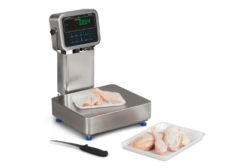Blog
Scale design concerns for meals programs
Scale design considerations for food applications
The two biggest factors in the success or failure of any given product in the food and beverage industry are product quality and quantity. To satisfy these requirements, manufacturers must obtain precise measurements of packaged food and beverage goods and accurately record this data. Additionally, each package should be prepared in a sanitary environment to prevent contamination and preserve product integrity.
Checkweighers are an ideal solution to monitor the weight of each and every package against pre-determined parameters, preventing over and underweight parcels from reaching customers. Checkweighers ensure continued product quality, while also safeguarding a company’s investment and improving profitability.
However, prior to implementing a checkweigher into food and beverage applications, manufacturers must take into consideration the scale’s design and durability to meet safety and sanitation requirements, minimize downtime and equipment repairs and improve production efficiency and visibility.
Ingress Protection (IP)
In applications were raw materials are being weighed, scales must be designed to withstand frequent, heavy washdown procedures. The combination of water, chemicals, high pressures and temperatures used in this cleaning process can prove fatal for electronic circuits and instrumentation. The Ingress Protection (IP) rating system is an internationally recognized scale that relates to proven protection against environmental factors such as liquids and solids. A product with the highest rating available, IP69K, offers complete assurance that it has been subjected to a challenging set of tests to ensure protection against penetration of high pressure, high temperature water and dust particles – making it ideal for use in conditions where equipment must be carefully sanitized.
Venting
In heavy washdown environments, equipment can often be subjected to rapid temperature changes. Extremes of temperature inside and outside the enclosure can result in expansion and contraction of gases, which in turn can lead to moisture and humidity becoming trapped inside. To prevent equipment malfunction or inaccuracies associated with moisture ingress, some checkweighers feature specially designed vent technology that helps neutralize the pressures between the inside and outside of the enclosure and keeps moisture out.
Housing
Since checkweighers are used to weigh everything from raw foods, such as meat and dairy, to finished, packaged products, they should be constructed of a suitable, non-toxic material that is unlikely to break or fracture. This prevents broken fragments and splinters from contaminating the product. Also, the number of joints, rivets, screws and dead spaces must be minimized to provide an easy-to-clean surface and minimize the potential number of food trap areas that pose a health and hygiene risk.
Stainless Steel
Scales constructed of stainless steel provide superior corrosion resistance, feature a non-absorbent finish and offer an inherent tolerance to temperature extremes. These characteristics enable checkweighers to operate even when subjected to a combination of water, chemicals, high pressures and temperatures that typically prove fatal for electronic circuits and instrumentation.
When used to weigh raw food products, the surface finish of the stainless steel weighing platter can have a significant effect on its hygiene characteristics, as a fine brush finish reduces the risk of bacteria growing on the surface. As an additional measure, the stainless steel should undergo a pickling and electro-polishing process to remove any impurities on the surface of the stainless steel. The rougher a surface finish is, the more likely it is that food will stick to it, creating a breeding ground for bacteria and micro-organisms.
Transferring data safely
In a heavy washdown environment, an increased number of cables provide more areas for bacteria to hide. If data transfer is important, the best option is to transfer this data wirelessly. This allows quick removal of unwanted cables for fast and simple washdown without altering the integrity of the IP69K watertight protection.
Look for accreditations
The National Sanitation Foundation (NSF), American National Standards Institute (ANSI) and the 3-A Sanitary Standards Committee have collaborated to develop a recognized standard for food processing equipment. Any product bearing the NSF/ANSI Standard 3-A 14159-1 -2010 accreditation can be considered to have met stringent standards for use in the food industry—specifically hygiene requirements for the design of meat and poultry processing equipment.
Safeguarding your business
Investing in a new checkweigher is all about safeguarding quality and, fundamentally, profits—underweight packages can lead to unhappy customers, while overweight packages lead to costly giveaway and overweight shipments. However, when it comes to the food industry, selecting a piece of equipment that meets strict hygiene criteria is vital.
For more information on checkweigher scale designs, visit www.averyweigh-tronix.com.
Laura Wilks, Global Communications Manager at Avery Weigh-Tronix, specializes in researching and writing about trends in the global industrial weighing market, specifically food, logistics and waste.

